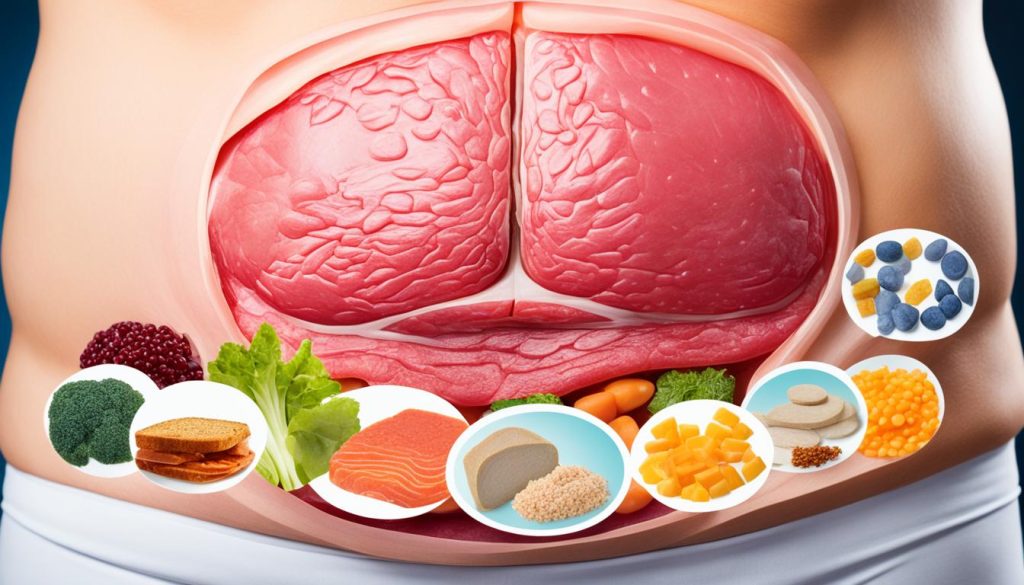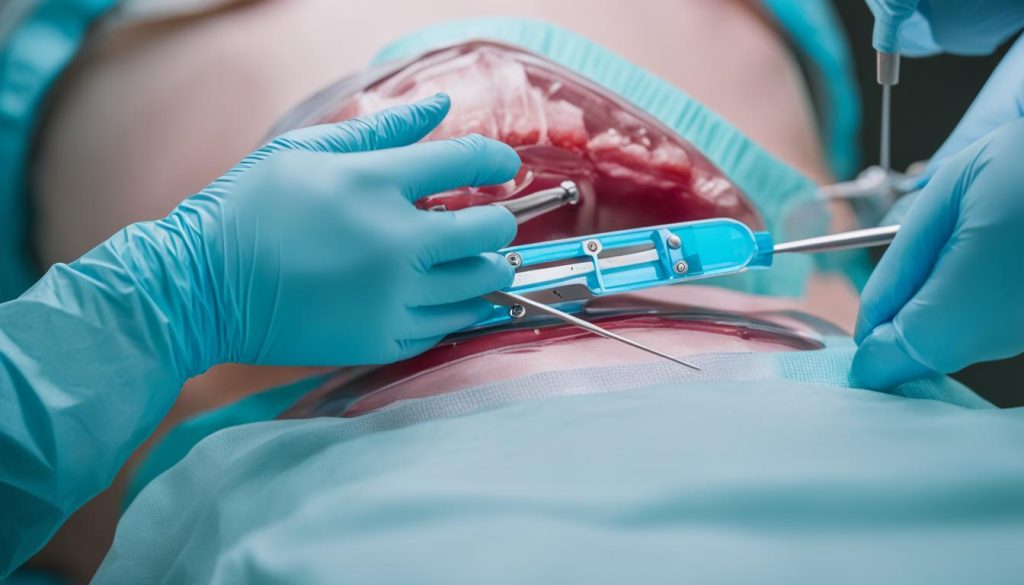The journey towards health and wellness following gastric sleeve surgery is paved with critical measures and dietary adjustments. An essential phase within this path is the adherence to a strict post-operative diet. Astutely mapped out to foster recovery and weight loss success, this diet is a linchpin in avoiding complications of premature solid food consumption. The risks of eating solid food after gastric sleeve surgery can derail the progress and healing of the body, leading to an array of medical complications. Understanding these risks is vital for patients, as the early reintroduction of solid food can obstruct the delicate post-surgical transition and impede the ultimate goal of achieving a healthier lifestyle.
Key Takeaways
- Strict adherence to the post-operative diet is crucial for recovery after gastric sleeve surgery.
- Eating solid foods too soon can lead to significant health risks and complications.
- Understanding the dangers of premature solid food consumption can prevent unnecessary setbacks.
- Patients should closely follow medical advice and avoid solid food until the stomach has fully healed.
- Transitioning to solid foods requires a careful, structured approach guided by healthcare professionals.
Overview of Gastric Sleeve Surgery and Post-Operative Recovery
Gastric sleeve surgery stands as a pivotal solution for individuals seeking a transformative approach to weight management and health improvement. With overall wellness as its core objective, this bariatric procedure significantly alters the structure of the stomach, thereby catalyzing profound lifestyle changes and indelible weight loss results. The journey post-surgery is underpinned by a meticulously structured recovery timeline and diet plan, which are critical to ensuring the success and safety of this life-altering operation.
Defining Gastric Sleeve Surgery and Its Objectives
The term gastric sleeve surgery refers to the medical intervention known as sleeve gastrectomy, which effectively reduces the stomach to approximately 15% of its original size. The primary objectives of gastric sleeve surgery encompass the curtailment of food intake and substantive weight reduction, which subsequently reduce the risks associated with obesity-related ailments, thus fostering an enhanced quality of life for patients.
The Critical Post-Surgery Recovery Timeline
After undergoing gastric sleeve surgery, patients are introduced to a post-operative recovery timeline designed to adapt the body to its new physiology. A phased approach to the recovery process is essential to foster appropriate healing, ease into a new dietary regimen, and prevent post-operative complications. This recovery timeline is a pivotal guide that ensures patients navigate the post-surgery period with confidence and support.
Key Components of the Post-Operative Diet
Understanding the key components of the post-operative diet is crucial for a smooth transition into a healthier eating pattern. The diet evolves in stages from liquid to purees and eventually, solid foods, allowing the newly formed stomach to heal and adjust. Adherence to this diet minimizes potential risks and maximizes the benefits of the surgery, anchoring patients firmly on the path to successful weight management.
| Phase | Diet Component | Duration | Examples |
|---|---|---|---|
| 1 | Liquid | 1-2 weeks | Broth, sugar-free gelatin |
| 2 | Pureed foods | 3-4 weeks | Blended fruits, mashed vegetables |
| 3 | Soft foods | 5-6 weeks | Cottage cheese, scrambled eggs |
| 4 | Solid foods | 7 weeks+ | Lean meats, whole grains |
What Happens if You Eat Solid Food After Gastric Sleeve
Understanding the consequences of eating solid food after gastric sleeve surgery is paramount for a successful recovery and long-term health. The risks of premature solid food consumption are not to be underestimated, as they can cause severe setbacks in the post-operative healing process.

A primary concern is gastrointestinal distress, which manifests as nausea, vomiting, and bloating. The discomfort extends beyond mere inconvenience, affecting the body’s ability to heal and increasing the possibility of more serious complications.
- Post-operative wound infections
- Gastrointestinal bleeding
- Dehiscence (wound separation)
- Stomach outlet obstructions
- Stomach perforation
Each of these concerns signals the necessity for patients to adhere to a carefully structured post-operative diet. This diet progresses from liquids to purees before solid foods are gradually reintroduced, minimizing the risks of premature solid food consumption.
| Healing Stage | Recommended Diet | Risks if Disregarded |
|---|---|---|
| 1-2 weeks post-op | Liquid nutrients | Infection, dehydration |
| 3-4 weeks post-op | Pureed foods | Gastrointestinal distress |
| 5-6 weeks post-op | Soft Solids | Stricture, obstruction |
| 7+ weeks post-op | Regular diet as tolerated | Chronic complications |
Each stage in the table above outlines the ideal progression of diet after gastric sleeve surgery, with associated risks of premature solid food consumption if the progression is rushed. The incremental steps are in place to allow the body to adapt to the changes and to promote optimal healing.
The guidance of a surgeon and a nutritionist is crucial for navigating the complex phases of dietary advancement post-surgery. They will ensure that patients understand the serious consequences of eating solid food after gastric sleeve before the stomach is fully ready to handle such foods.
Potential Complications from Premature Solid Food Consumption
Navigating the post-operative phase after gastric sleeve surgery necessitates a careful and informed approach to diet reintroduction. An important aspect to consider is the timing and progression toward solid foods, which should be gradual to avoid potential health risks. Premature consumption of solid foods can cause serious complications, emphasizing the need for vigilance and adherence to dietary guidelines.
Risks of Gastrointestinal Distress and Stricture
Eating solid foods before the stomach is ready can lead to significant risks of gastrointestinal distress. Symptoms such as nausea, vomiting, and abdominal pain are indicators that the stomach has not yet healed sufficiently for solid food. These discomforts can jeopardize patient recovery and well-being. Furthermore, such hasty advancement in diet can heighten the risks of stricture. A stricture is a serious condition characterized by the narrowing of the stomach’s opening, which can impede food passage and necessitate medical intervention.
Challenges in Nutrient Absorption and Associated Health Risks
The introduction of solid foods prematurely can also introduce challenges in nutrient absorption. With a healing gastric system, efficient nutrient uptake is crucial. Introducing complex solids too early might lead to inadequate absorption, resulting in nutritional deficiencies and impacting overall health. Additionally, associated health risks include dehydration, anemia, and loss of muscle mass, highlighting the critical nature of timing and dietary compliance during recovery.

Properly Integrating Solids into Your Diet After Gastric Sleeve Surgery
Embarking on the road to recovery after gastric sleeve surgery entails careful dietary planning and a thorough understanding of the process of transitioning to solid foods after gastric sleeve surgery. Once medically approved by your surgeon, the shift from liquids to solids must be approached with meticulous care to avoid any setbacks. To ease this transition, beginning with foods that are soft and gentle on the digestive system is key. Preferred choices should be nutritionally rich yet simple to digest, such as pureed fruits, steamed vegetables, and soft proteins like eggs or well-cooked fish.
Each stage of reintroducing solid foods warrants attention to detail, adjusting portion size in sync with your new stomach capacity. The practice of eating smaller, more frequent meals helps manage hunger and ensures consistent nutrient intake throughout the day. Mindfulness while eating plays a pivotal role in avoiding potential complications. It involves slow, deliberate chewing and taking the time to savor each bite, which aids in digestion and satisfaction. The act of mindful eating not only fosters a healthier relationship with food but also aligns with the tips for incorporating solids after surgery that emphasize eating techniques as much as food choices.
Nutritionists often highlight the importance of monitoring your body’s reactions to new foods and the gradual expansion of your diet to more complex solids. Paying close attention to how your body tolerates each phase is crucial for smoothly integrating solids into your diet after gastric sleeve. This journey is also an opportunity to forge lasting dietary habits that promote sustained health and well-being. Remaining in consultation with your healthcare providers, adhering to their tailored guidance, and maintaining patience with your body’s adaptation will facilitate a successful dietary transition post-surgery.


